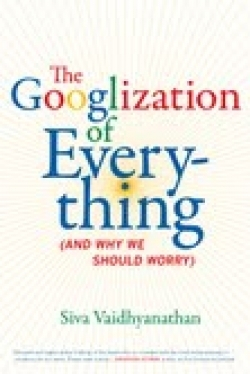The Googlization of Everything
(And Why We Should Worry)
With its myriad services and applications, Google seems to offer everything short of a cure for the common cold. According to Vaidhyanathan, a professor of media studies and law at the University of Virginia, however, that might not necessarily be a good thing. The author warns of the danger of putting too much trust in Google, which came on the scene in the late 1990s and has become perhaps the “go to” source for web searches, videos (YouTube), and blogging (Blogger). These services, along with a suite of online programs that include word processing and spreadsheets, come with a substantial price: a lack of privacy.
The author describes how Google keeps track of user preferences and proclivities during web searches, and how that information can be transferred into demographic data that has the potential to be used for nefarious purposes, despite the company’s motto “Don’t be evil.” It’s not only Internet searchers who are at risk, he warns. Websites and businesses vie for dominance in Google’s rankings, and go to great lengths to secure a place on the opening page, if not the number one spot. (Just how does Wikipedia, not known for careful editing and accuracy, manage to wind up at the top of the search so often?)
Vaidhyanathan takes his case beyond the shores of North America and discusses the impact the US-based Google has on foreign countries and the difficulties of language and culture differences for some users. One example: a town in France called Eu decided to change its name because that search phrase brought up too many other suggestions, such as the European Union, the element europia, or the Internet domain designation for Europe.
And while Google is practically worshipped in the US, more oppressive countries such as China, put heavy clamps in the form of censorship upon its use. Vaidhyanathan notes one particular “offshoot”—Google Books—as a wonderful idea fraught with problems. The philosophy was to digitize millions of volumes to make them available at no cost to web users, thus bridging nations and cultures through shared knowledge. Unfortunately, and perhaps unsurprisingly, Google’s management did not count on the publishers and authors who would insist on their copyright protection.
We have become lazy and dependent, the author warns, in trusting an entity that may or may not be there down the road. Readers might detect a whiff of paranoia in The Googlization of Everything, but that doesn’t mean there isn’t merit in the author’s musings. Remember the Trojan Horse.
Reviewed by
Ron Kaplan
Disclosure: This article is not an endorsement, but a review. The publisher of this book provided free copies of the book to have their book reviewed by a professional reviewer. No fee was paid by the publisher for this review. Foreword Reviews only recommends books that we love. Foreword Magazine, Inc. is disclosing this in accordance with the Federal Trade Commission’s 16 CFR, Part 255.

